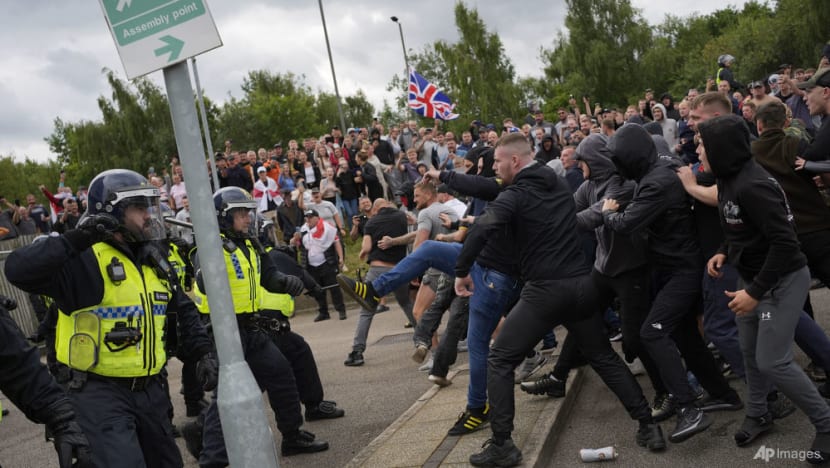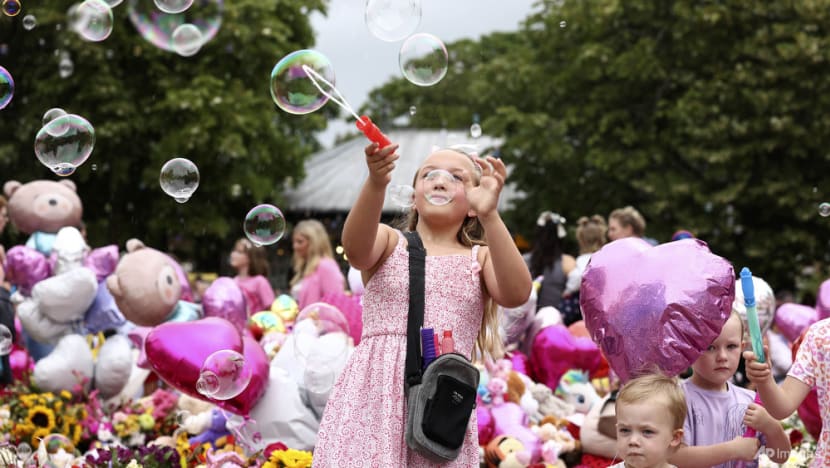CNA Explains: Why are people rioting across the UK?
Misinformation has been blamed for the clashes.

Trouble flares during an anti-immigration protest outside the Holiday Inn Express in Rotherham, England, Aug 4, 2024. (Danny Lawson/PA via AP)

This audio is generated by an AI tool.
Far-right, anti-immigrant riots have erupted across multiple towns and cities in Britain since last week, in the worst bout of social unrest in 13 years.
Protesters have been attacking hotels sheltering asylum seekers and mosques, causing widespread destruction, and clashing with police officers.
What triggered the violence?
The disturbances first broke last Tuesday (Jul 30), after three young girls were killed and five more children critically injured in a knife attack at a Taylor Swift-inspired dance class in the northwestern English seaside town of Southport.
Before the suspect’s identity was confirmed, false rumours quickly spread online that the suspect was a Muslim asylum seeker.

Far-rights groups used the narrative to stoke tensions between communities and spread Islamophobic sentiment, leading to attacks on immigrants.
The stabbing suspect has since been named as Axel Rudakubana, a 17-year-old boy born in the Welsh capital of Cardiff to Rwandan parents.
“The tensions have clearly been fuelled by social media, which has been simply dishonest in the way in which it has represented the circumstances around the knife attack last week,” said Bruce Wilson, director of RMIT University’s European Union Centre of Excellence.
“Far from being committed by a Muslim, that was a young man from a Christian family who was born in the United Kingdom,” he told CNA’s Asia Now on Tuesday.
“So the extent to which these rumours have spread about his alternative identity are simply wrong.”
Related:
Political analyst Alexander Hilton believes the years of politicians stoking anti-immigrant hate is now having consequences.
“It's been brewing for a long time,” he said, adding that the riots have been triggered by outright lies on social media.
“This isn't an organisation that's rioting. This is just an upwelling of violence that people feel like they've got permission to execute because politicians have been saying what they're thinking for so long.”
Hilton said the rioters are not really connected or organised.
“But if this extends for any period of time, you are then looking at the communities that feel threatened organising themselves, and that escalates the situation,” he told CNA’s Asia First on Tuesday.
“You end up with things getting even more violent. So the government really does have to deal with this very quickly.”
What are authorities doing to end the unrest?
British Prime Minister Keir Starmer on Monday vowed “swift criminal sanctions” for violent protesters, as he sought to quell days of anti-immigration rioting involving far-right agitators.
He also announced a new "standing army" of specially-trained police officers to support local forces, after an emergency meeting with ministers and police chiefs to tackle the disorder.
“What they've done, I imagine, is just to cancel some leave and put some budget into some overtime,” said Hilton.
He said Britain, which has revelled in its free speech culture, could “very seriously” consider emergency laws to prevent disinformation, and hold social media giants accountable for the harms done through their platforms.
“This is a really messy situation for the British government to be in right now,” he added.
“In terms of anti-disinformation laws, it's a very complicated area in the UK because people aren't going to give up freedom of speech very easily,” he said.
“But there has to be a difference between disinformation that is nonsense, and disinformation that has actual real-world consequences of violence.”
Police have since arrested hundreds of protesters nationwide.
“Something has to be done simply to restore public order, and some sense of confidence that a government is in control,” said Wilson.
“Of course, in the medium to longer term, they need to address these issues of concern in the communities that have lost those industrial opportunities of the past.”
On whether a social media crackdown is the answer, he said it can only go so far.
The unrest “taps into that deep-seated sense of distress that many people in the UK have, as they've lost that confidence about their own economic futures”, Wilson said.
“And when you lose that confidence, it's easy to see why people will blame newcomers who they think are taking jobs that might otherwise be theirs. This, of course, was a significant factor in Brexit, which was not so long ago.”
However, he stressed that the impact of immigration in the UK is “very different” from what some people believe.
“If anything, immigration has enhanced the functioning of the British economy,” he added.
“But these are very difficult ideas to convey to people who are feeling like they're being done to in one way or another.”
What’s next?
The rioting is a major challenge for Starmer, who was elected just a month ago after leading the Labour Party to a landslide win over the Conservatives.
Wilson said: “Starmer’s big challenge is to provide decent economic futures for the people in these parts of England that feel like they've been left behind.”
Meanwhile, further protests are being planned, causing ethnic minority communities to become worried.
Several countries, including Australia, Indonesia and Malaysia, have since issued safety warnings to their citizens in the UK due to the unrest.
“The short answer is that the intervention by the government and by the police will fairly quickly bring these riots back under control. So the disruption, I think, is just short-term,” said Wilson.
“However, the underlying reasons for the distress will not simply disappear on their own. The killing of those three young girls was a catalyst for violence, which has got much deeper-seated causes, and those causes need to be addressed.”















